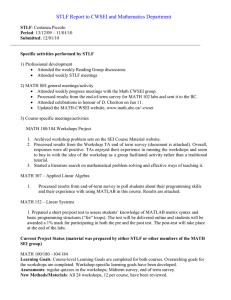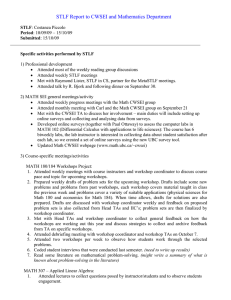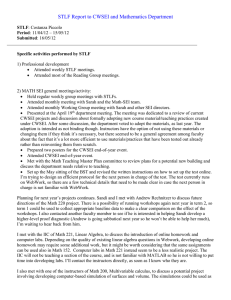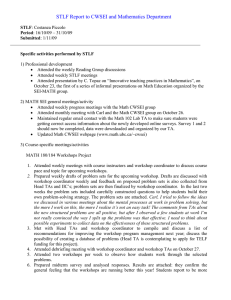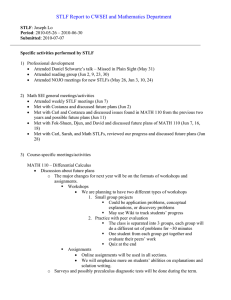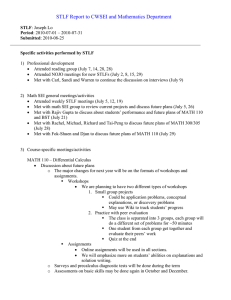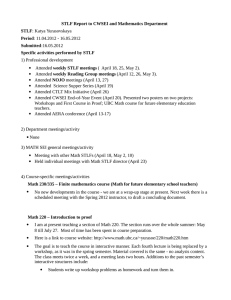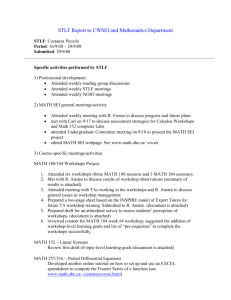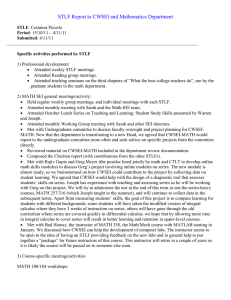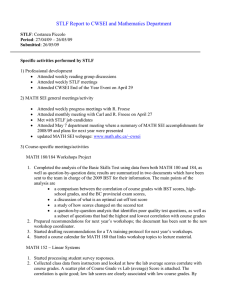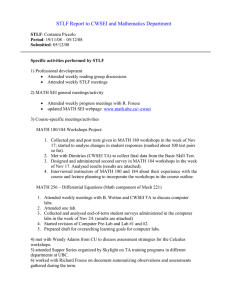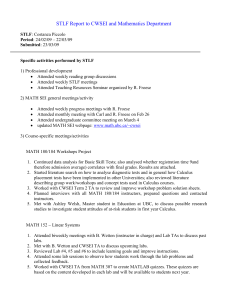January 31, 2010 Report
advertisement
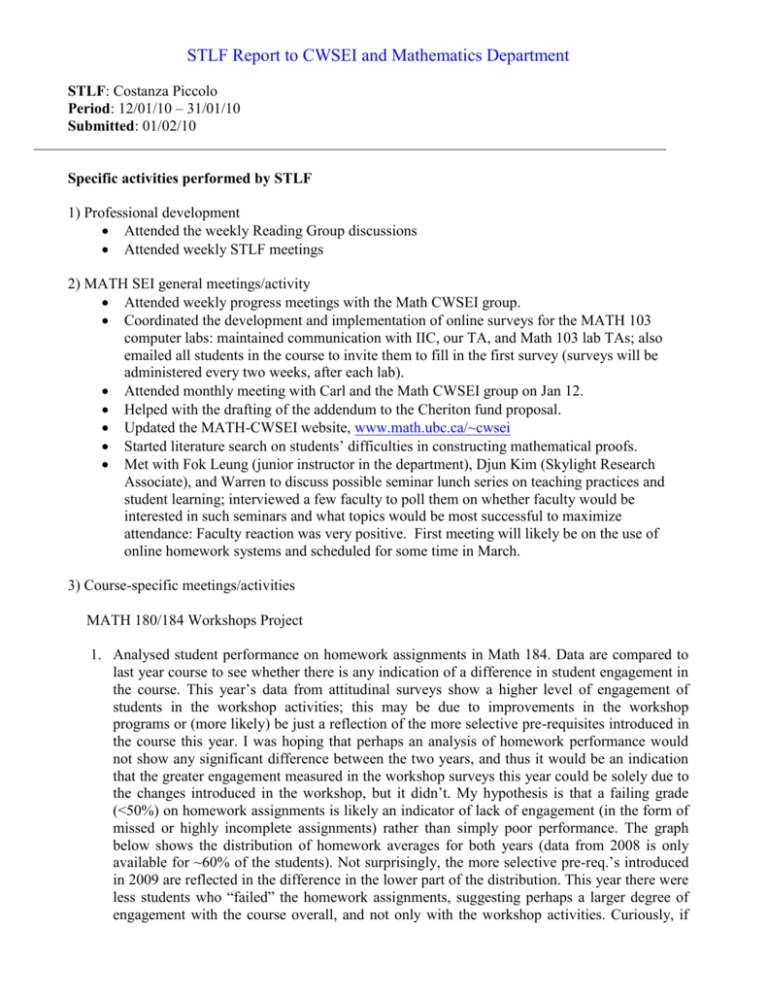
STLF Report to CWSEI and Mathematics Department STLF: Costanza Piccolo Period: 12/01/10 – 31/01/10 Submitted: 01/02/10 Specific activities performed by STLF 1) Professional development Attended the weekly Reading Group discussions Attended weekly STLF meetings 2) MATH SEI general meetings/activity Attended weekly progress meetings with the Math CWSEI group. Coordinated the development and implementation of online surveys for the MATH 103 computer labs: maintained communication with IIC, our TA, and Math 103 lab TAs; also emailed all students in the course to invite them to fill in the first survey (surveys will be administered every two weeks, after each lab). Attended monthly meeting with Carl and the Math CWSEI group on Jan 12. Helped with the drafting of the addendum to the Cheriton fund proposal. Updated the MATH-CWSEI website, www.math.ubc.ca/~cwsei Started literature search on students’ difficulties in constructing mathematical proofs. Met with Fok Leung (junior instructor in the department), Djun Kim (Skylight Research Associate), and Warren to discuss possible seminar lunch series on teaching practices and student learning; interviewed a few faculty to poll them on whether faculty would be interested in such seminars and what topics would be most successful to maximize attendance: Faculty reaction was very positive. First meeting will likely be on the use of online homework systems and scheduled for some time in March. 3) Course-specific meetings/activities MATH 180/184 Workshops Project 1. Analysed student performance on homework assignments in Math 184. Data are compared to last year course to see whether there is any indication of a difference in student engagement in the course. This year’s data from attitudinal surveys show a higher level of engagement of students in the workshop activities; this may be due to improvements in the workshop programs or (more likely) be just a reflection of the more selective pre-requisites introduced in the course this year. I was hoping that perhaps an analysis of homework performance would not show any significant difference between the two years, and thus it would be an indication that the greater engagement measured in the workshop surveys this year could be solely due to the changes introduced in the workshop, but it didn’t. My hypothesis is that a failing grade (<50%) on homework assignments is likely an indicator of lack of engagement (in the form of missed or highly incomplete assignments) rather than simply poor performance. The graph below shows the distribution of homework averages for both years (data from 2008 is only available for ~60% of the students). Not surprisingly, the more selective pre-req.’s introduced in 2009 are reflected in the difference in the lower part of the distribution. This year there were less students who “failed” the homework assignments, suggesting perhaps a larger degree of engagement with the course overall, and not only with the workshop activities. Curiously, if you restrict the comparison to the first sections of the course (Sect 101, N=185 in 2008 and N=204 in 2009, both thought by (different) faculty members), the lower part of the distribution is inverted: less people were “failing” homework in 2008 than in 2009! 2008 (N = 320) Math 184 2009 (N = 504) 40% 35% 30% 25% 20% 15% 10% 5% 0% 0-45 46-68 69-79 80-90 91-100 2. Completed literature search on mathematical problem solving and effective ways of teaching it. MATH 307 – Applied Linear Algebra 1. Started a review of homework assignments to check whether they match the course learning goals and to evaluate to what level they require students to engage with MATLAB: The end of term survey revealed that not only about 33% of students were unable to trace a simple “for” loop, thus showing poor basic programming skills, but also less than 50% of students said they would likely use the software in the future. My hypothesis is that homework assignments involving Matlab were either too easy to show the true usefulness of the software, or too challenging, and therefore demoralising. MATH 256 – Mech 221: Differential Equations 1. Analized end-of-term survey results based on the day of the week students attended the computer labs. (Data is attached.) Lab observations indicated students in Monday labs were having a harder time than students in the rest of the week. It seems to me that student responses from the Monday section are somewhat different from the rest of the week. Note that the survey sample size is only N=51, less than 50% of the class (there are ~120-130 students in the class). Current Project Status (material was prepared by either STLF or other members of the MATH SEI group) MATH 100/180 –104/184 Learning Goals: Course-level Learning Goals are completed for both courses. Overarching goals for the workshops are completed. Workshop-specific learning goals have been developed. Assessments: regular quizzes in the workshops; Midterm survey, end of term survey. New Methods/Materials: All 24 workshops, 12 per course, have been reviewed. MATH 257/316 Learning Goals: First draft of topic-level learning goals has been started. Assessments: none New Methods/Materials: none MATH 307 Learning Goals: Topic-level learning goals have been reviewed (Chapter 1 and 2 are completed) Assessments: Online surveys New Methods/Materials: Lecture Notes continue to be updated. Plan for immediate future work MATH 180/184 Workshops: 1. Prepare a summary of the current status of research on mathematical problem solving and effective ways of teaching it. 2. Run a few student interviews to investigate students’ abilities in solving calculus problems and try to identify which of the steps commonly listed in the literature as key elements of problemsolving are most challenging for our students. 3. Review Math 180 workshop problem sets to improve quality of problems and include problemsolving strategies, possibly based on results from student interviews. 4. Continue the literature search on group work. 5. Contact students with low workshop attendance to ask them why they are choosing not to attend. 6. Write up results of student interviews that were conducted last semester. 7. Prepare workshop observation checklist for future Head TAs. MATH 257/316 1. Work with instructor to complete topic-level learning goals for the course. 2. Archive Excel tutorials on CWSEI archive (This was actually done by the instructor last year). MATH 307 1. Complete review of lecture notes and topic-level learning goals (Chapter 3 and 4); 2. Prepare more assessment tools (lists of questions that can be asked in class, challenging homework assignments, online pre-reading quizzes and surveys); 3. Continue to assess course material (assignments, exam questions, lecture notes) to make sure it matches course learning goals; 4. Organize and archive questions collected during lectures.
